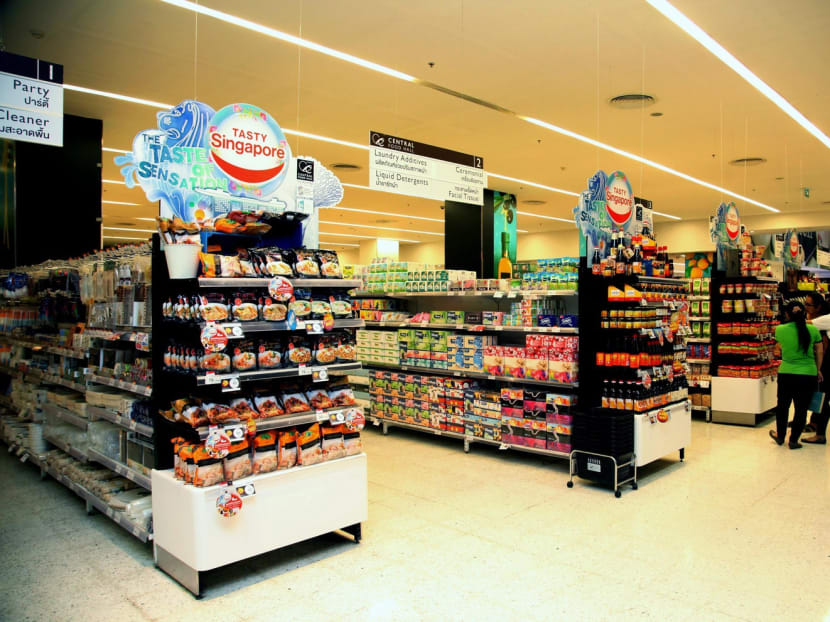S’pore-made satay, soya sauce find spots on S-E Asian shelves
SINGAPORE — Say you are living in Thailand and craving some Singapore-style satay or tang yuan. Or perhaps you are missing the taste of the chilli or soya sauce you grew up with. You could get a friend to bring you some when they visit, or you could just pop into one of the supermarkets owned by Central Food Group in Thailand.

After promotional activities in supermarkets, many Singaporean companies have succeeded in securing permanent listings in Thailand. The programme plans to run a partnership in Rustan’s stores in the Philippines. Photo: Thailand Central Food Group
SINGAPORE — Say you are living in Thailand and craving some Singapore-style satay or tang yuan. Or perhaps you are missing the taste of the chilli or soya sauce you grew up with. You could get a friend to bring you some when they visit, or you could just pop into one of the supermarkets owned by Central Food Group in Thailand.
Home-grown Leo Satay — a third-generation family business whose products are sold in selected Giant and Cold Storage stores in Singapore — has found its way onto the shelves of supermarkets overseas by participating in a programme by IE Singapore, which has served to grow its business and attract new customers.
Kwong Cheong Thye (KCT), another local company that specialises in dark and light soya and chilli sauces, also joined the IE programme, with the aim of building its product into a recognised brand across the region.
Back in 2011, Leo Satay and KCT were the first few companies to join the Working in Partnership (WIP) programme by IE Singapore, the government agency driving Singapore’s external economy, and the Singapore Manufacturing Federation, supported financially by IE’s Local Enterprise and Association Development programme.
Through the programme, IE and SMF help put locally made food on the store shelves of supermarket chains in South-east Asia.
Singapore food products have traditionally not been easily found in supermarkets in Asia, as companies face high entry costs and difficulty with product registration. On their own, Singapore food manufacturers lack the networks and financial resources to promote their products.
The WIP programme helps with this by identifying supermarkets to partner with, negotiating optimal product listing fees and following up with promotional activities such as in-store sampling, displaying products at the end of aisles, and organising food fairs in Thailand and Myanmar to create awareness of the Singapore offerings in supermarkets. SMF also consolidates the food products and ships them via a shared container to the supermarkets, thereby saving costs.
Mr Raymond Leo, general manager for Leo Satay, says the new business segment this IE-SMF programme has created has helped increase total sales for his company by 20-30 per cent.
“We took part in this IE programme through the SMF. We now have three products — satay pork, satay chicken, satay beef — on the shelves of the supermarket in Thailand under Central Food Group. They are ready to eat. The quantity is the same as the ones sold in Singapore supermarkets, 10 sticks per pack with gravy provided. The satays are also sold at the same price here and overseas,” said Mr Leo. The company also exports its satay to hotels in China and the Middle East.
Ms Alice Woo, director for KCT said: “We started with five to six items on the shelves of supermarkets in Thailand in 2011, now we have more than eight items on the shelves there.” Ms Woo said the company is still experimenting with which products sell best in Thailand, but noted that the take-up rate of its goods in the Thai supermarkets has had a 40-50 per cent rate of improvement.
Mr Ivan Tan, group director, South-east Asia Group for IE said: “The WIP programme, which started with 50 unique products across 10 participating companies in 2011, has grown to 800 unique products from 80 companies in 2016. There are now two participating supermarkets in South-east Asia, namely Central Food Group in Thailand and City Mart in Myanmar, the biggest supermarket chains in the respective countries.”
Through the sharing of resources and elimination of the importer/distributor, the programme helps companies save on high distribution costs, resulting in cost savings that allow the companies to list the products at more competitive selling prices.
Other than Leo Satay and KCT, some other products that have found their way onto the aisles of supermarkets overseas include Tat Hui’s noodles, Prima’s ramen, Chinatown’s glutinous rice ball and Woh Hup sauces.
Following the promotional activities in the supermarkets, many companies have succeeded in securing permanent listings. The programme also plans to run a partnership in Rustan’s stores in the Philippines in the near term. Other than the South-east Asian markets, SMF said another participating supermarket is the Yonghui Superstore in China.
Aside from the WIP programme, IE has also previously had other schemes to help put Singapore’s food in overseas supermarkets. In 2014, it partnered with the Singapore Food Manufacturers’ Association on a promotion in Hero supermarkets in Indonesia, and also worked with IM Holdings on a Singapore-branded food aisle promotion in FoodHall supermarkets in Indonesia in 2015 and 2016.
“Singapore’s SME food manufacturers, left on their own, have little negotiation power and financial resources to promote their products overseas. WIP overcomes this through allowing local food exporters to consolidate their efforts and ship their products directly to overseas markets,” said deputy president of SMF Sunny Koh.
“This initiative helps food companies to reduce operational costs, and at the same time leverage on the strength of collective Singapore branding. Furthermore, Singapore’s food products are known worldwide for their high level of quality and safety, and local companies can use this fact to their advantage as they internationalise.”





